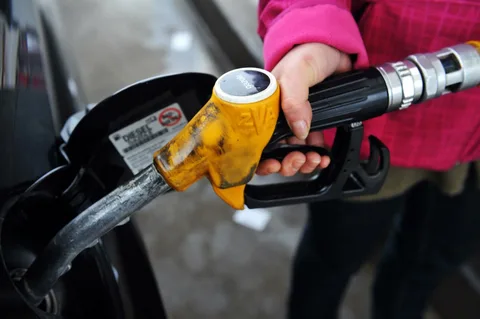Accidentally filling your diesel car with petrol or your petrol car with diesel is a common mistake that can lead to significant engine damage. Understanding the dangers of mixing petrol and diesel is crucial for preventing costly repairs and keeping your vehicle running smoothly. In this article, we will guide you through what happens when petrol enters a diesel engine, why it’s dangerous, and how you should handle the situation if it ever happens.
Why Mixing Petrol in a Diesel Engine is Dangerous
The petrol in diesel engine mistake can result in severe damage. Diesel engines rely on fuel that has high lubrication properties, allowing the engine components to work without excessive friction. Petrol, on the other hand, is less oily and acts more like a solvent. When petrol enters a diesel engine, it dilutes the diesel fuel, causing reduced lubrication. This leads to increased friction between engine components, resulting in wear and damage.
Moreover, diesel engines use compression to ignite the fuel, whereas petrol engines rely on spark plugs. When petrol is introduced into a diesel engine, it can ignite too early, causing misfiring and even leading to catastrophic damage to pistons, valves, and other critical components.
Consequences of Petrol in Diesel Engine
Mixing petrol in diesel engine can have several severe consequences:
- Engine Misfires – Petrol can ignite earlier than diesel, causing improper combustion cycles, which can lead to engine misfires.
- Fuel Injector Damage – Diesel injectors are designed to handle thicker fuel, and petrol’s thinner consistency can result in damage or clogging of these injectors.
- Fuel Pump Failure – Petrol’s low lubrication can damage the diesel engine’s high-pressure fuel pump, leading to expensive replacements.
- Excessive Smoke – If the engine continues to run on a mixture of petrol and diesel, excessive smoke and unusual smells may be produced.
Symptoms of Petrol in Diesel Engine
Knowing the symptoms of petrol in diesel engine can help you take swift action before serious damage occurs. Common symptoms include:
- Difficulty Starting the Engine – If petrol has been introduced into the diesel system, you may struggle to start your vehicle, as the fuel won’t combust as expected.
- Rough Idling and Stalling – The engine might run rough, misfire, or stall as a result of improper fuel combustion.
- Loud Knocking Noises – Diesel engines will typically make loud knocking sounds if petrol is mixed in, due to premature combustion.
- Loss of Power – Your car may experience a loss of power and acceleration due to improper fuel mixture.
What to Do If You’ve Put Petrol in a Diesel Car
If you realize that you’ve put petrol in a diesel car, it’s essential to act quickly to minimize damage. Follow these steps:
- Do Not Start the Engine – If you haven’t started the car yet, do not turn the key. This will prevent the petrol from circulating through the engine and fuel system, reducing the risk of severe damage.
- Drain the Tank – The best solution is to have the fuel tank professionally drained by a mechanic or a fuel drainage service. This process will remove the contaminated fuel from the system.
- Flush the Fuel System – Once the petrol has been drained, the fuel system should be flushed to ensure that all traces of petrol are removed.
- Refill with Diesel – After the system is flushed, refill the tank with clean diesel fuel. Some mechanics may also recommend adding a fuel additive to help lubricate the engine components.
- Check for Damage – Depending on how much petrol was introduced into the system and how far the car was driven, there may be damage to the fuel pump, injectors, or other components. A mechanic should inspect the engine to assess any damage.
Preventing Petrol in Diesel Mistakes
To avoid the costly consequences of petrol in diesel engine, follow these preventive measures:
- Double-Check the Fuel Pump – Always take a moment to verify that you are selecting the correct fuel type at the pump.
- Label Your Car – If you frequently switch between petrol and diesel vehicles, consider placing a label on your fuel cap as a reminder of the correct fuel type.
- Be Cautious When Borrowing Vehicles – If you’re driving a rental or borrowing a car, always confirm the correct fuel type before filling up.
How Mechanics Fix the Problem
If petrol in diesel engine has already caused damage, mechanics can perform several repairs, depending on the extent of the damage. These repairs may include:
- Replacing the Fuel Filter – The fuel filter will need to be replaced to remove any petrol residue.
- Repairing or Replacing Fuel Injectors – If the injectors are clogged or damaged, they may need to be cleaned or replaced.
- Replacing the Fuel Pump – If the petrol has damaged the fuel pump, it will need to be replaced.
- Engine Repair or Replacement – In extreme cases, if the engine has suffered significant damage, more extensive repairs or even a full engine replacement may be required.
conclusion
The most crucial factor in preventing long-term damage when petrol in diesel engine occurs is taking immediate action. The longer the petrol remains in the diesel system, the higher the likelihood of damage. Early detection and professional intervention can help avoid costly repairs and keep your vehicle in good condition.
for read more informative blog click here.
